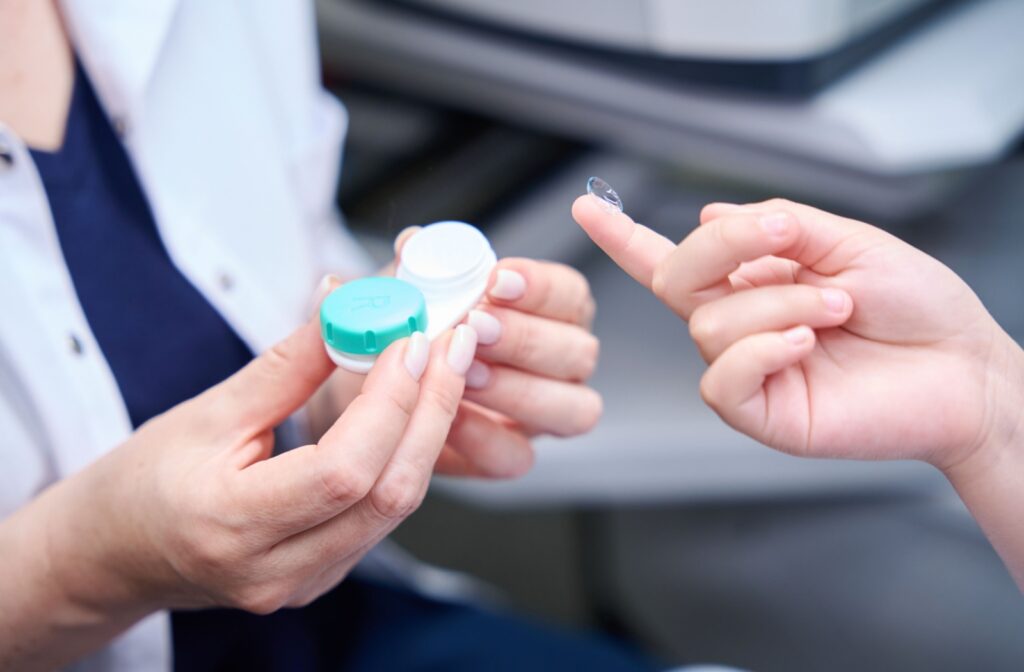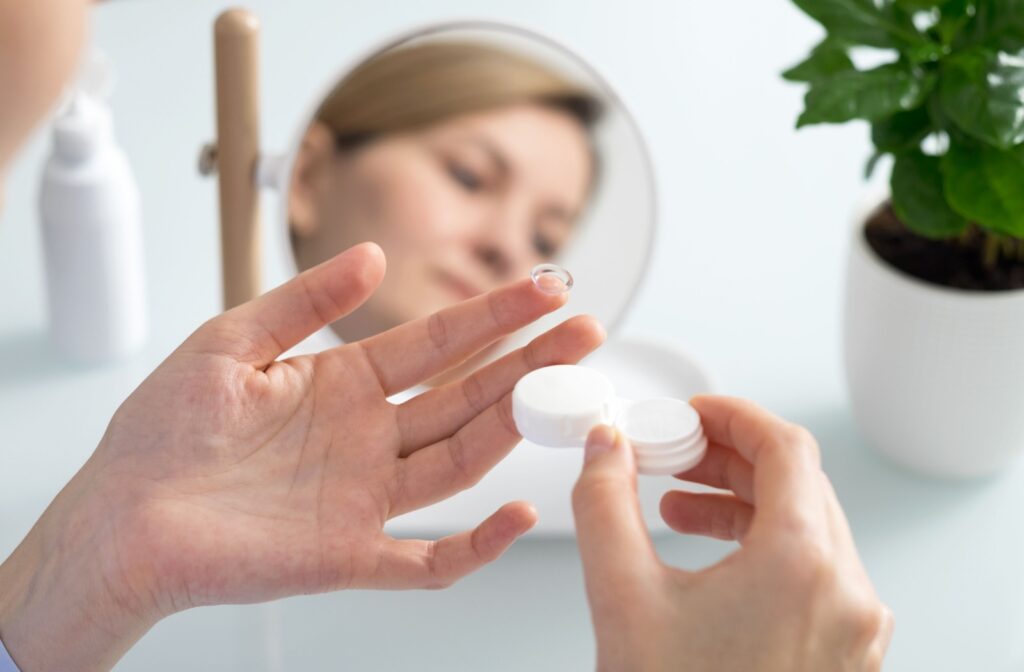Contact lenses can be a simple way to make life easier. They give you clear vision, they’re designed to be comfortable, and they let you avoid the risk of damaging a pair of glasses. But that doesn’t mean they’re free from potential complications—it’s important to follow proper habits for eye hygiene when you wear contact lenses.
Contact lenses can go bad, and using expired lenses poses serious risks to your eye health. An expired lens can easily transmit bacteria and harmful substances to your eyes, which can then cause infections or damage. In rare cases, it’s possible that wearing expired contact lenses could even cause an eye emergency.
Don’t put your eyes at risk—you should avoid wearing expired contact lenses wherever possible. If your contacts are expired or causing any issues with your vision and comfort, be sure to schedule a checkup. We can help you wear contact lenses safely and comfortably.
How Long Do Contact Lenses Last?
The lifespan of your contact lenses depends primarily on their material and type. Contacts are usually made from breathable plastics or soft silicone hydrogels. These materials are designed to keep the eye hydrated while allowing oxygen through—but they also degrade over time, even if you haven’t used them.
Typically, contact lenses can last from 1–4 years when they haven’t been worn, depending on the type you have. If you’re ever unsure about the type of lens you have, check the case and original packaging. There should be a clear expiration date printed on the side. This is the last date you should consider your lenses safe—past this, you’re putting your eyes at risk if you wear them.
Different types of lenses have different replacement schedules too, and proper care is the key to protecting your eyes. Typically, you can follow these guidelines:
- Daily disposable lenses: These are meant for single use and should be discarded at the end of each day. They’re typically made of a softer material designed to be significantly more comfortable, but this same material breaks down faster than others,
- Bi-weekly lenses: These are designed to be replaced every 14 days with proper cleaning and storage. The materials used here tend to be sturdier than soft lenses.
- Monthly lenses: These are intended for up to 30 days of use with consistent cleaning and care. They require constant maintenance, as they’re made of more robustr materials designed to last significantly longer.
Why Do Contact Lenses Expire?
Your contacts should always be stored in a clean case with fresh, sterile solution. This helps prevent bacterial buildup by trapping the lens in an airtight environment. In the case of disposable lenses, they might also be in a sealed blister pack. The case, the package, and the solution can all eventually become compromised. The seals may wear down, the material may crack, and bacteria may come into contact with your contacts.
When your contact case or the packaging they’re in is compromised, the same place you store your lenses becomes a great environment for bacteria to thrive, multiply, and spread. If you wear a lens that’s been exposed to bacteria, you’re transferring bacteria directly to your eye.
Meanwhile, the lenses themselves can also eventually wear down. They may become warped, scratched, or torn over time. Even if you’ve cleaned and stored them properly, they can still eventually lose their effectiveness.
The Risk of Wearing Expired Contact Lenses
Expired contacts aren’t harmless—they can directly lead to:
- Eye infections, which can result from bacteria or fungi growing on old lenses.
- Irritation or discomfort caused by degraded materials in expired lenses.
- Blurred vision due to lenses that no longer fit correctly or have lost their clarity.
- More severe issues, such as corneal ulcers, which may lead to permanent damage if untreated.
If you experience anything unusual while wearing contacts—like redness, discomfort, or blurred vision—don’t ignore it. These are all signs you need to visit an optometrist.
How Often Should You Replace Your Contact Lenses?
Replacing contact lenses regularly is the key to keeping your vision clear. But it’s also about keeping your eyes healthy and reducing the risk of severe problems. Try keeping an eye on all the expiration dates so you know when to replace your contacts.

These are all signs it’s time to update your lenses:
- Cloudiness or a scratchy feeling while wearing your lenses.
- Discolouration or visible damage to your lenses.
- Reduced comfort, even after cleaning or using fresh solution.
- Persistent redness or irritation in your eyes.
- Expiration dates that have passed on the packaging.
These point to wear and tear, damage, or contamination. It helps to keep a fresh backup supply on hand if possible. However, if not, make sure to visit your optometrist before your lenses expire—this way, you can have your replacement lenses sooner rather than later.
Tips for Taking Care of Contact Lenses
No matter what, proper care for your contact lenses is one of the most important factors in eye hygiene. A good routine keeps your lenses in good condition and helps keep your eyes safe.
For better contact lens care, make sure to always:
- Wash your hands thoroughly before touching your lenses or eyes.
- Use fresh cleaning solution daily—avoid reusing old solution.
- Store lenses in a clean, well-sealed case and replace the case every 3 months.
- Never expose your lenses to water, whether from a tap, pool, or shower.
- Avoid sleeping in contact lenses.
A little extra care can go a long way when it comes to contacts. If you’re ever unsure, remember—we can help.
Don’t Put Your Eyes At Risk
Taking care of your contact lenses means taking care of your eyes. Expiration dates are important—and don’t forget to practice proper hygiene. If you ever notice discomfort, irritation, or anything unusual, don’t put your eyes at risk.
Instead, come talk to our team at Broadway Eyecare. We’ll work with you to find a solution to your problem. Whether you need an eye exam, new contacts, or a new approach to clearer vision altogether, we’re here to help. Book an appointment with us today!









